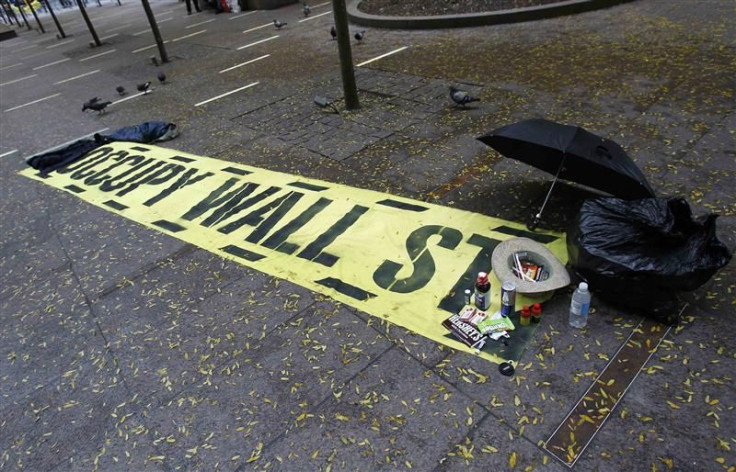Occupy Wall Street: After Zuccotti Park Occupation, Protesters Seek Shelter

Now that the occupation of Zuccotti Park has ended, where to put the occupiers?
As Occupy Wall Street transitions away from the Lower Manhattan encampment that was formerly its beating heart, organizers face the task of finding somewhere for the park's former inhabitants to stay. After the police swept away the tent village in a middle of the night raid, a judge ruled that protesters could return to the park but could not erect structures to shield them from the elements.
For now, several churches have been allowing Occupiers to spend the night. But that is widely viewed as a temporary solution, something attested to by a banner on the newly formed Housing working group's webpage that reads We are in desperate need of housing and transport.
A Housing Crisis
We have a housing crisis within our movement, said Zachary Kamel, a 25-year-old member of the working group. There are a lot of people that have nowhere to go at night that are expending energy to find a place to sleep instead of on the things the movement is really about.
Kamel estimated that on Monday night more than 100 people were provided shelter. He confirmed that Occupy Wall Street's General Assembly, its main decision-making body, had allocated money to help some of the churches offset the extra heating and electricity costs.
We are not paying rent, but we are subsidizing their charity, Kamel said.
The proposal to authorize the money spurred some debate, but supporters defend the decision to provide for Occupiers that were essential to the movement's tenacity and public visibility. Some of them gave up jobs or apartments.
A lot of people came down here and got arrested, risked injury, stayed here a long time, said John Penley, 60, also a member of the Housing working group. So if Occupy Wall Street has the money then they have a duty to help them out.
Housing Issue Discussion Includes Debate on Role of Holding Space in Movement
The Housing group is working for now to streamline the process by which they screen people to ensure they are somehow involved with the movement and then direct them to participating churches. But there is a larger debate percolating through Occupy Wall Street about how to find a long-term solution. The discussion remains in the informal stage, and ideas have have included reoccupying a public place, renting space and squatting in abandoned buildings or warehouses.
It can be a contentious discussion, in part because some within the movement feel that it should evolve beyond its former focus on physically occupying a space. A small group of protesters initiated a hunger strike this weekend on a parcel of land owned by Trinity Church, hoping to win the church's permission to occupy the space. A slew of commenters on an online posting announcing the hunger strike faulted the approach.
Your doing it for space?!?!?!?! for space?!?!?!?! come on guys smarten up this isn't about space, occupying space is the vehicle not the destination.... one commenter wrote. Another commenter concurred, writing that the strike would overshadow the movement's other organizing efforts and mean its message of economic injustice would no doubt be buried in the immediate human story of three guys sitting on the concrete, wanting to take over Duarte Square.
The disagreement also illuminates a rift that opened, to vastly oversimplify the movement's dynamics, between those who actively participated in General Assemblies and those who lived in the park but did not engage in the direct democracy aspects. Michael Blas recently traveled to New York from Philadelphia, where he had lost his job and his fiancé after immersing himself fully in Occupy Philadelphia, and he said he saw similar fissures in both movements.
Blas, 27, has spent his time in New York conducting a survey of people who were displaced from Zuccotti Park, seeking ideas on how to establish a permanent place to stay. The Housing working group has taken up the same task.
Nobody said 'hey, you're not a democratic process person' when they were getting arrested, Blas said. Nobody said 'hey, you're not a democratic process person' when they were going on marches.
© Copyright IBTimes 2025. All rights reserved.




















